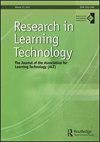科学教育教师视角下的元技术学习观
IF 1.2
Q2 EDUCATION & EDUCATIONAL RESEARCH
引用次数: 0
摘要
作为个人化身,Metaverse可以在科学、技术、工程和数学(STEM)教室中非常有效,例如实用和实验的科学课程。在这篇文章中,目的是报告一项与教师的看法和他们对在伊朗教育系统中使用虚拟工具教授基础科学课程的态度有关的研究。本研究采用定性的内容分析和以描述性统计为代表的定量分析。前者包括对来自两组职前教师(无经验)和在职教师(有经验)的28个样本进行半结构化访谈,参与者有机会通过访谈表达他们对Metaverse工具的看法。后者包括一项调查,旨在了解他们对Metaverse技术潜在用途的态度。结果表明,没有经验的“数字原生代”的本质与虚拟世界是一致的,这一群体对在教学中使用虚拟世界有相对较高的信心。产生这些新想法需要一定程度的经验,这是职前教师所不具备的。然而,这一差距可以通过一群经验丰富的教师来弥补,他们可以利用自己的经验帮助没有经验的教师了解如何将这些工具纳入实践。本文章由计算机程序翻译,如有差异,请以英文原文为准。
The outlook of learning through metaverse technology from the perspective of teachers in the science education
As a personal avatar, Metaverse can be very effective in science, technology, engineering and mathematics (STEM) classrooms such as science classes that are practical and experimental. In this article, the aim is to report a study related to the perception of teachers and their attitudes towards the use of metaverse tools in teaching elementary science classes in Iranian education system. The study uses qualitative content analysis as well as quantitative analysis represented by descriptive statistics. The former includes of semi-structured interviews with 28 samples from two groups of pre-service teachers (inexperienced) and in-service teachers (experienced), which participants were given the opportunity to express their perceptions of Metaverse tools through interviews. The latter comprises a survey was designed to get their attitudes towards the potential use of Metaverse technology. The results showed that the nature of inexperienced ‘digital native’ is in line with the metaverse world and this group had relatively high confidence in using Metaverse in their teaching. Generating these new ideas requires a degree of experience that pre-service teachers do not have. However, this gap can be bridged through a group of experienced teachers who can use their experience to help inexperienced teachers understand how such tools can be integrated into practice.
求助全文
通过发布文献求助,成功后即可免费获取论文全文。
去求助
来源期刊

Research in Learning Technology
EDUCATION & EDUCATIONAL RESEARCH-
CiteScore
6.50
自引率
0.00%
发文量
13
审稿时长
20 weeks
 求助内容:
求助内容: 应助结果提醒方式:
应助结果提醒方式:


